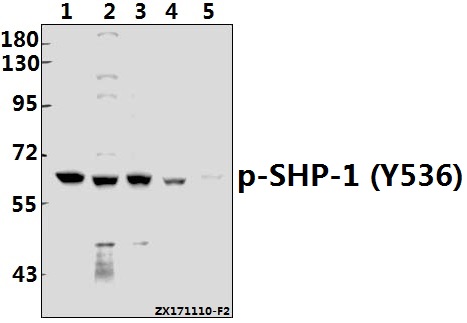Product Name :
SHP-1 (phospho-Y536) polyclonal antibody Background :
SHP-1 (PTPN6) is a non-receptor protein tyrosine phosphatase that is expressed primarily in hematopoietic cells. The enzyme is composed of two SH2 domains, a tyrosine phosphatase catalytic domain, and a carboxy-terminal regulatory domain. SHP-1 removes phosphates from target proteins to downregulate several tyrosine kinase-regulated pathways. In hematopoietic cells, the amino-terminal SH2 domain of SHP-1 binds to tyrosine phosphorylated erythropoietin receptors (EpoR) to negatively regulate hematopoietic growth. Overexpression of SHP-1 in epithelial cells results in dephosphorylation of the Ros receptor tyrosine kinase and subsequent downregulation of Ros-dependent cell proliferation and transformation. Following ligand binding in myeloid cells, SHP-1 associates with the IL-3R β chain and downregulates IL-3-induced tyrosine phosphorylation and cell proliferation. Product :
Rabbit IgG, 1mg/ml in PBS with 0.02% sodium azide, 50% glycerol, pH7.2 Storage&Stability :
Store at 4°C short term. Aliquot and store at -20°C long term. Avoid freeze-thaw cycles. Specificity :
p-SHP-1 (Y536) polyclonal antibody detects endogenous levels of SHP-1 protein only when phosphorylated at Tyr536. Immunogen :
Synthetic phosphopeptide derived from human SHP-1 around the phosphorylation site of Tyrosine 536. Conjugate :
Unconjugated Modification :
Phosphorylation
SHP-1 (phospho-Y536) polyclonal antibody Background :
SHP-1 (PTPN6) is a non-receptor protein tyrosine phosphatase that is expressed primarily in hematopoietic cells. The enzyme is composed of two SH2 domains, a tyrosine phosphatase catalytic domain, and a carboxy-terminal regulatory domain. SHP-1 removes phosphates from target proteins to downregulate several tyrosine kinase-regulated pathways. In hematopoietic cells, the amino-terminal SH2 domain of SHP-1 binds to tyrosine phosphorylated erythropoietin receptors (EpoR) to negatively regulate hematopoietic growth. Overexpression of SHP-1 in epithelial cells results in dephosphorylation of the Ros receptor tyrosine kinase and subsequent downregulation of Ros-dependent cell proliferation and transformation. Following ligand binding in myeloid cells, SHP-1 associates with the IL-3R β chain and downregulates IL-3-induced tyrosine phosphorylation and cell proliferation. Product :
Rabbit IgG, 1mg/ml in PBS with 0.02% sodium azide, 50% glycerol, pH7.2 Storage&Stability :
Store at 4°C short term. Aliquot and store at -20°C long term. Avoid freeze-thaw cycles. Specificity :
p-SHP-1 (Y536) polyclonal antibody detects endogenous levels of SHP-1 protein only when phosphorylated at Tyr536. Immunogen :
Synthetic phosphopeptide derived from human SHP-1 around the phosphorylation site of Tyrosine 536. Conjugate :
Unconjugated Modification :
Phosphorylation
-
 Western blot (WB) analysis of SHP-1 (phospho-Y536) polyclonal antibody at 1:500 dilution Lane1:MCF-7 whole cell lysate(40ug) Lane2:H1792 whole cell lysate(40ug) Lane3:A549 whole cell lysate(40ug) Lane4:3T3-L1 whole cell lysate(40ug) Lane5:H9C2 whole cell lysate(40ug)
Western blot (WB) analysis of SHP-1 (phospho-Y536) polyclonal antibody at 1:500 dilution Lane1:MCF-7 whole cell lysate(40ug) Lane2:H1792 whole cell lysate(40ug) Lane3:A549 whole cell lysate(40ug) Lane4:3T3-L1 whole cell lysate(40ug) Lane5:H9C2 whole cell lysate(40ug) -
 Immunohistochemistry (IHC) analyzes of SHP-1 (phospho-Y536) polyclonal antibody in paraffin-embedded human breast carcinoma tissue at 1:100.
Immunohistochemistry (IHC) analyzes of SHP-1 (phospho-Y536) polyclonal antibody in paraffin-embedded human breast carcinoma tissue at 1:100.
Bioworld Biotech only provide peptides for our antibodies and do not provide additional peptide customization services.
Price/Size :
USD 368/1mg/vial
Tips:
For phospho antibody, we provide phospho peptide(0.5mg) and non-phospho peptide(0.5mg).Describe :
Blocking peptides are peptides that bind specifically to the target antibody and block antibody binding. These peptide usually contains the epitope recognized by the antibody. Antibodies bound to the blocking peptide no longer bind to the epitope on the target protein. This mechanism is useful when non-specific binding is an issue, for example, in Western blotting (WB) and Immunohistochemistry (IHC). By comparing the staining from the blocked antibody versus the antibody alone, one can see which staining is specific; Specific binding will be absent from the western blot or IHC performed with the neutralized antibody.Formula:
Synthetic peptide was lyophilized with 100% acetonitrile and is supplied as a powder. Reconstitute with 0.1 ml DI water for a final concentration of 10 mg/ml.The purity is >90%,tested by HPLC and MS.
Storage:
The freeze-dried powder is more stable. For short time at 2-8°C. For long term storage store at -20°C.
Note :
This product is for research use only (RUO only). Not for use in diagnostic or therapeutic procedures.
 SHP-1 (phospho-Y536) polyclonal antibody
SHP-1 (phospho-Y536) polyclonal antibody  Datasheet
Datasheet COA
COA MSDS
MSDS SHIP
SHIP